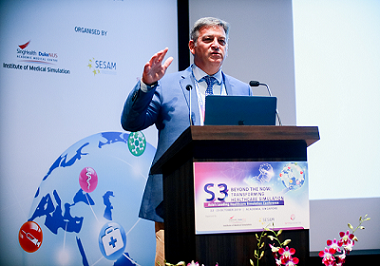Prompt, Design, Simulate: The AI Way to Develop Simulation Scenarios
Main Conference ProgrammeDate: 06 Nov 2025, Thu | Time: 1500 - 1630 | Track Type: Workshops
Format: Face-to-face | Venue: Level 2, L2-S3&S4, Academia
Speaker: Mrs Erica Hinojosa
As artificial intelligence continues to transform healthcare education, simulationists are discovering new ways to streamline scenario development while enhancing realism and learner engagement. This workshop introduces participants to the integration of AI platforms with structured prompting techniques and simulation design templates to create dynamic, learner-centered healthcare simulation scenarios. Whether you're new to AI or looking to refine your workflow, this session offers practical tools and strategies to elevate your simulation design process.
Delegates will begin by exploring a range of AI platforms and compare their capabilities, advantages, and limitations in the context of healthcare simulation. Through guided demonstrations and collaborative discussion, delegates will learn how to apply prompts to generate scenario content that aligns with clinical learning objectives. The workshop will then transition into hands-on application, where participants will use simulation design templates to structure and refine AI-generated content into complete, usable scenarios..
By the end of the session, delegates will have developed multiple simulation scenarios using AI-assisted methods. They will gain confidence in selecting appropriate AI tools, crafting effective prompts, and applying design templates to ensure consistency, educational value, and realism. Delegates will leave with a toolkit of resources and examples that can be immediately implemented in their own simulation programs.
This interactive workshop empowers healthcare educators and simulation professionals to harness the potential of AI in scenario development. By combining innovative technology with proven instructional design frameworks, delegates will be equipped to create high-impact simulations that support clinical reasoning, decision-making, and interprofessional collaboration.
Learning Outcomes
- Identify a variety of AI platforms suitable for creating simulation scenarios, and evaluate the strengths, limitations, and best-use cases of each.
- Discuss effective prompting strategies and other techniques to guide AI in generating realistic, relevant, and educational simulation content.
- Create AI-generated content with structured design templates to develop high-quality scenarios for implementation.
© 2025 SingHealth Group. All Rights Reserved.














